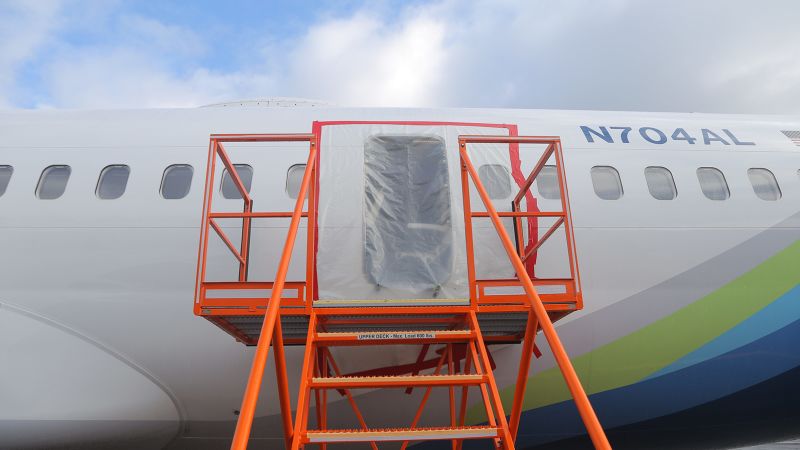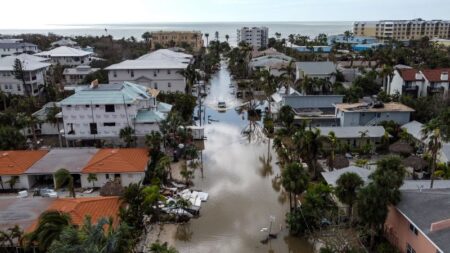Before the plane took its first flight, Boeing had removed and reinstalled the part that blew off of an Alaska Airlines flight on January 5, according to reports from the New York Times and the Seattle Times, both citing a person familiar with the matter.
Although federal investigators continue to probe the incident and have not reached any conclusions, the details could provide critical new insight into what may have caused a gaping hole to form in a 737 Max 9 mid-flight.
The reports said the door plug, a part of the plane used to seal the aircraft when no exit door is installed, was removed because Spirit AeroSystems, which makes the fuselage for 737 Max 9 planes, needed to make other repairs to the door plug’s rivets, used to connect various parts together. Boeing then reinstalled the door after Spirit AeroSystems made the repair.
Boeing and Spirit AeroSystems are under multiple investigations that probe their safety policies and procedures. The Federal Aviation Administration recently expanded its Boeing probe to include Spirit AeroSystems, the National Transportation Safety Board is also reviewing the incident, and Washington Democratic Sen. Maria Cantwell, chair of the Senate Commerce Committee, announced Wednesday that she would hold a future hearing to investigate Boeing’s safety record.
Boeing said it couldn’t comment on the reports about what may have led to the door plug blowing off the plane, citing the ongoing investigation.
“As the air safety agency responsible for investigating this accident, only the US National Transportation Safety Board can release information about the investigation,” Boeing said in a statement.
Spirit did not respond to a request for comment.
Although details are sparse, there have been some clues about what went wrong over the past few weeks. Boeing CEO David Calhoun on January 9 acknowledged the company made a “mistake” at a staff-wide safety meeting, but he did not specify what that mistake was. NTSB Chair Jennifer Homendy has demanded Boeing provide answers about any mistake it made as part of its safety investigation, which is separate from the FAA’s audit.
Alaska Airlines CEO Ben Minicucci on Tuesday revealed the carrier found “some loose bolts on many” Boeing 737 Max 9s in an interview for “NBC Nightly News with Lester Holt.”
The FAA has grounded the 737 Max 9 since the incident. But late Wednesday, it approved a set of inspection criteria for the 171 grounded planes that, if followed, could return the grounded aircraft to service.
But the agency also issued a stern warning to Boeing: “The January 5 Boeing 737-9 Max incident must never happen again.” And it said it would not grant any production expansion of the 737 Max lineup while its safety probe of Boeing continues.
Airlines, especially Alaska and United, had faced hundreds of cancellations a day because of the grounding.
“The exhaustive, enhanced review our team completed after several weeks of information gathering gives me and the FAA confidence to proceed to the inspection and maintenance phase,” FAA Administrator Mike Whitaker said in a statement Wednesday.
Each of the 171 grounded aircraft must be inspected, including the bolts, fittings and guide tracks for the door plug. The process also includes tightening fasteners and performing “detailed inspections of…dozens of associated components.”
FAA on Sunday also required airlines to ensure older Boeing 737 planes with similar door plugs were secure. The FAA said airlines operating the Boeing 737-900ER model should visually inspect the planes but didn’t require them to be grounded. Alaska Airlines on Thursday said it has completed all of those inspections “with only one minor finding, which was immediately corrected.”
In a statement Wednesday, Boeing said it will “continue to cooperate fully and transparently with the FAA and follow their direction as we take action to strengthen safety and quality at Boeing.”
But Whitaker noted Boeing itself is not out of the woods.
“Let me be clear: This won’t be back to business as usual for Boeing,” he said. “We will not agree to any request from Boeing for an expansion in production or approve additional production lines for the 737 Max until we are satisfied that the quality control issues uncovered during this process are resolved.”
Boeing has faced repeated quality and safety issues with its aircraft for five years now, leading to the long-term grounding of some jets and the halt in deliveries of others.
The 737 Max’s design was found to be responsible for two fatal crashes: one in Indonesia in October 2018 and the other in Ethiopia in March 2019. Together, the crashes killed all 346 people aboard the two flights and led to a 20-month grounding of the company’s best-selling jets, which cost it more than $21 billion.
Internal communications released during the 737 Max grounding showed one employee describing the jet as “designed by clowns, who in turn are supervised by monkeys.”
Late last month, Boeing asked airlines to inspect all of their 737 Max jets for a potential loose bolt in the rudder system after an airline discovered a potential problem with a key part on two aircraft.
Its quality and engineering problems have extended beyond the 737. Boeing also had to twice halt deliveries of its 787 Dreamliner, for about a year starting in 2021 and again in 2023, due to quality concerns cited by the FAA. And the 777 jet also suffered a grounding after an engine failure on a United flight scattered debris onto homes and the ground below.
Two Max variants — the Max 7 and the Max 10 — are still awaiting approval to begin carrying passengers. This latest incident complicates that, Wells Fargo analysts noted.
Read the full article here












